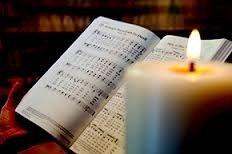Charlotte Kroeker, PhD., CMI Executive Director
Do you have a personal hymnal for which you have great affection? The blue 1990 Presbyterian Hymnal with my name imprinted is on the shelf behind my desk next to my Bible. This hymnal is a gift for singing in our church choir for 5 years. I refer to it often and will continue to reference it when Glory to God replaces the blue books in our hymnal racks. The blue book is forever part of my life because the precious hours and years spent singing and playing from it cannot be replaced.
A recent blog addressed the issue of what to do with old hymnals, and, in the spirit of recycling and artistic use, the suggestion was made to cut hymns from the Advent and Christmas section to make Christmas ornaments. It seems that a vertical slice of a hymn is just the right length for a paper chain and a new craft activity for children.
I could not help but wonder what children are learning by tearing pages out of hymnals to make crafts. Will they tear pages out of Bibles too—so much Scripture is found in the texts of those hymns. Will the wisdom of hundreds of years of Christians contained in those hymns be reduced to bits of paper on a Christmas tree without knowing the journeys they represent? Will the children learn Christianity is disposable? Will they consider the music meaningless blobs on paper rather than potentially beautiful sounds for praise to God?
 Granted, books wear out and clothes get old. I recently read an article saying 87% of us have a sentimental T-shirt we refuse to toss. It is no longer wearable, but we cannot bear to part with it because it represents an important part of our past. More so with hymns: how do we deal with the sacred texts of our hymnals and re-purpose them when the denomination changes hymnals? Surely we can find places in Sunday School and meeting rooms, church family homes and church-related facilities where standard hymnody can continue to be sung. Many hymns are retained from the old to the new hymnals—we are still singing hymns written in the 4th century. Our hymnals are the treasury of wisdom of the saints past and present who accompany us on our journey. The music helps us remember these texts, and is a way of worshiping in community.
Granted, books wear out and clothes get old. I recently read an article saying 87% of us have a sentimental T-shirt we refuse to toss. It is no longer wearable, but we cannot bear to part with it because it represents an important part of our past. More so with hymns: how do we deal with the sacred texts of our hymnals and re-purpose them when the denomination changes hymnals? Surely we can find places in Sunday School and meeting rooms, church family homes and church-related facilities where standard hymnody can continue to be sung. Many hymns are retained from the old to the new hymnals—we are still singing hymns written in the 4th century. Our hymnals are the treasury of wisdom of the saints past and present who accompany us on our journey. The music helps us remember these texts, and is a way of worshiping in community.
Hymnals are important!
I might hope that, instead of crafts or ornaments on a tree, children might be given the hymn book as a treasure, along with a chart to track the hymns they learn. Family devotional times can include singing of hymns appropriate to the season. Rev. John Neely, Associate Pastor for Music at Westminster Presbyterian Church in Dayton, Ohio, shared at our summer 2013 workshop the 50 hymns their congregation intends for all young people to know by graduation from high school. Children are intentionally taught these hymns as part of their Sunday School and graded choir programs. Thank you, John! Click here for the list.
From recent neuroscience research we have learned the power of music imprints important milestones and religious experiences in our lives. (See The World in Six Songs by Daniel Levitin, especially Chapters 6 & 7 on “Religion” and “Love.”) We know dementia and Alzheimer patients retain the ability to play the piano and sing hymns after speech is lost. Passing on the hymns of our faith from generation to generation may be not only a community faith-building exercise, but it also could be one of the most important life generating gifts we can give to each other. (See Craig Barnes, “Closing Hymns” in Christian Century, November 16, 2010.)
In an era when so much music is downloadable, many have questioned the cost and stewardship of printing a hymnal. Why is such an investment warranted? In her article “Singing from One Book: Why Hymnals Matter,” Christian Century, May 1, 2013, Mary Louise Bringle makes a good case for the ephemeral nature of music projected on a screen or printed on loose pieces of paper, and alternatively, the value of viewing entire hymns in their strophic poetic form, seeing hymns in relation to each other in the book, the value of sharing a book with a child and pointing to stanzas of hymns.
Hymns matter and hymnals matter, so that we, with the Psalmist, can sing with joy in our hearts to the Lord.